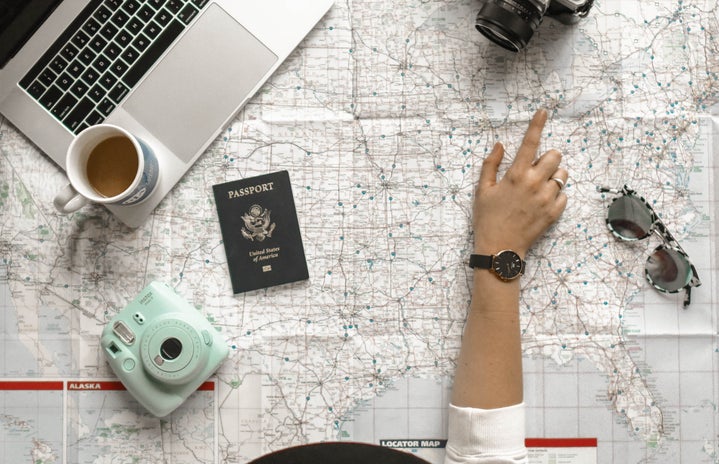It has been eight months since I came to the U.S. This was my first experience staying in another country for an academic year. There were a lot of differences between the cultures in Japan and the U.S. For my final Her Campus article, I’m wanted to dig into seven interesting aspects of American culture that I noticed during my stay as a study abroad student.
1. Saying “Bless you”
This is my favorite part of American culture! I’m now used to hearing this phrase, but at first I was so surprised at saying “bless you” to someone every time he or she sneezed. The meaning of the phrase depends on the person. I learned that the meaning of “bless you” derives from the notion that evil things released from the body could re-enter it again, which is something to avoid. Also, there is a belief that one’s heart momentarily stops when they sneeze, so saying “bless you” indicates someone has “come back to life.” There was a funny incident during my drawing class when a student sneezed every 30 seconds. Some of the students around me said “bless you” each time he sneezed, and although it was humorous, I could not hear the professor’s instructions very well.
2. Wearing leggings
I have seen that most American girls wear leggings at WSU. In Japan, Japanese women usually wear a dress or short pants with leggings rather than wearing only leggings as bottoms. However, wearing them is really comfortable. I tried to wear only leggings, but I felt like that I wasn’t wearing anything for bottoms! For me, it is so strange and makes me worried about the shape of my body. I still hesitate to wear only leggings, and I was so surprised that many female students wore leggings (even during the cold winter season). In addition to leggings, it is hard for me to believe that American students wear T-shirts with short pants or leggings during cold days. Wearing only leggings is not only an American culture, but it was a surprising thing for me and other Japanese students to witness.
3. Buying university goods
I think every WSU student has university-manufactured clothes. I heard a rumor about why students buy and wear WSU clothes, which was that it is because there are no good clothing shops nearby and they don’t care about their fashion in their daily life too much, except for social parties. Is it true? They may just be showing school spirit. Back at my university, there are some official university clothes. They’re not fashionable, so most students don’t want to wear them; my university also doesn’t have a clothes section in the bookstore. I saw many people at WSU wearing not only university clothes but also other Minnesota T-shirts, football jerseys, etc. I could tell that they love where they live and their local sports teams.
4. Getting tattoos
Regardless of their age, the larger portion of Americans have tattoos, ranging from small to big ones. It is an astounding fact that the professors also have tattoos. Having tattoos does not have a good meaning in Japan; it is associated with gangs and criminals. But it is an old stereotype, so currently the image for tattoo is being changed. I was surprised by the fact that having a tattoo is a usual thing in the U.S., as well as piercings.
5. Driving
Driving directions and positions of the handle are completely different from Japan. Japanese cars have a right handle, so Japanese drive on the left side of roads. Everything is opposite here! I wanted to drive in Winona, but I felt scared about doing so—I decided to ride as passenger instead!
6. Eating snacks during class time
Some classrooms ban eating, but most classes permit snacks or foods during instruction. Making noise, such as eating and calling during class time, is considered bad behavior in Japan, so I thought it was an interesting scene to witness some students here in America eat their breakfast and snacks while listening to lectures. I usually become hungry during class time, so this is a nice culture for me. However, I wish students would eat their snacks and food without being so noisy and smelly (lol).
7. Differing temperature units
I’m not sure, but does every American know that they are the only ones in the world who use “Fahrenheit” as the unit of temperature? It makes me really confused about why they don’t use Celsius. When I would ask about the temperature of the day or week to my American friends during the beginning of last semester, I was confused when they would reply “60 degrees.” I couldn’t convert Fahrenheit to Celsius, so I misunderstood what they said for 60 degrees Celsius. I thought I would experience the end of the world due to this misunderstanding. American students were likewise confused when I would say “negative 10 degrees” when I was asked the same question about the weather. This is because they misunderstood what I stated as Fahrenheit. This was, perhaps, the most “unique” thing about American culture for me to wrap my head around.
These are just a few parts of interesting American culture that I remembered during my stay. Overall, however, I really like the American culture and lifestyle. Before I leave Winona, I hope to find a few more unique aspects of American culture that are different from those in Japan!



